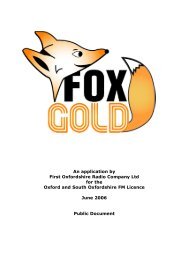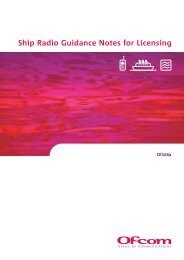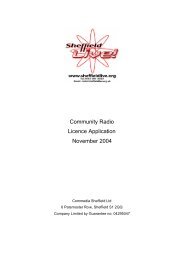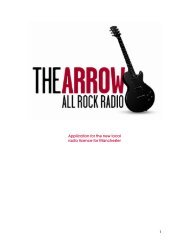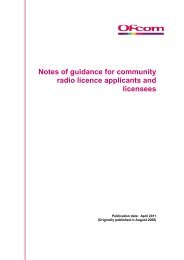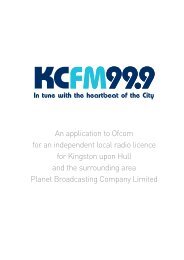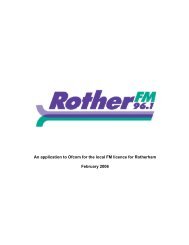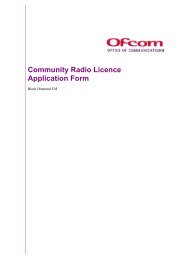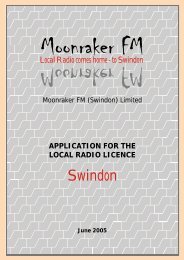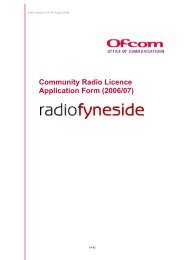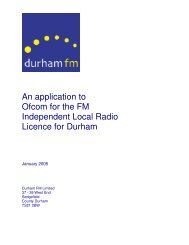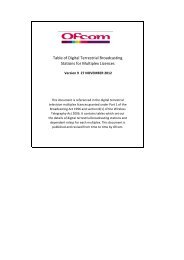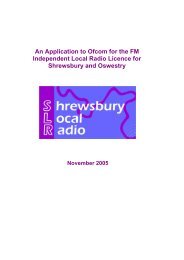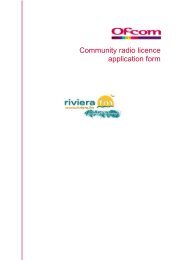Radio Plymouth - Ofcom Licensing
Radio Plymouth - Ofcom Licensing
Radio Plymouth - Ofcom Licensing
Create successful ePaper yourself
Turn your PDF publications into a flip-book with our unique Google optimized e-Paper software.
RADIO PLYMOUTH<br />
The perceived relative paucity of music available on other stations is also much commented on.<br />
This response is typical: “There used to be more music, but now it seems to be more and more chitchat,<br />
which gets on my nerves” (female, B, 40). This lady was speaking about <strong>Plymouth</strong> Sound,<br />
which she turned to originally for the mix of local news with music. Others have made the switch to<br />
stations playing what they perceive to be “better music”.<br />
“I listen to Pirate. I’m at home all day, so I listen to the radio a lot, and I listen to <strong>Radio</strong> Devon which I<br />
enjoy for the talking, but on Pirate, I like the music” (female, C1, 45).<br />
This comment supports data from our main telephone survey. Many people are listening to a service<br />
from out of the county because the music is more suited to their needs – but they also want<br />
meaningful speech aimed at them and their locality.<br />
Conclusions for <strong>Radio</strong> <strong>Plymouth</strong><br />
<strong>Radio</strong> <strong>Plymouth</strong> need not define itself by the competition, but should it wish to do so, it should look<br />
at the music policy of Pirate FM and <strong>Radio</strong> 2, rather than <strong>Plymouth</strong> Sound. Our data shows that<br />
some music should have a slightly harder edge than other services, with fewer ballads than one<br />
might hear on <strong>Radio</strong> 2 and <strong>Radio</strong> Devon. There should be more music at breakfast than existing<br />
services. We will achieve this by providing more tracks per hour at breakfast and in the evenings<br />
than other services, achieved by fewer commercials and crisper links.<br />
It is imperative that a new station achieves an optimum balance between music and speech. Music<br />
is more important than speech, and “good music” is obviously better than bad. Similarly, speech too<br />
must be good speech, not bad. People have strong opinions on what’s bad: factual, informative<br />
speech, that can still be fun, is preferable to inane chat by presenters who are trying to be<br />
something they can probably never be – national stars.<br />
<strong>Plymouth</strong> Sound’s music policy seems to be not much liked by our potential audience. Pirate FM’s<br />
music is more palatable but the speech content is not targeted at <strong>Plymouth</strong> residents and Classic<br />
Gold does not make a huge impact. By marrying a more interesting musical output with meaningful<br />
content for <strong>Plymouth</strong>, an undoubted need can be met.<br />
Will they listen?<br />
Nine out of ten respondents (88%) are very or quite likely to listen to a new radio station aimed at<br />
<strong>Plymouth</strong> in our core age range of 35 to 54 year olds. Other age bands score highly too, with one<br />
exception: young adults 15-24 at 73% (men) and 78% (women). This is still three out of four people<br />
who say they would listen, although a considerable drop from 88%. Once again, it appears that the<br />
youngest age band would be less likely to use a new service than their older neighbours.<br />
54



